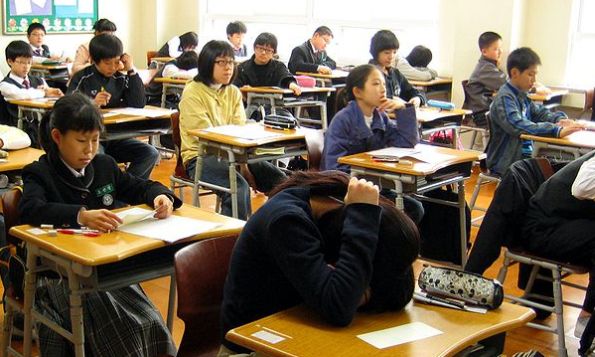South Korea’s Flawed Education System

August 25, 2017
My father used to enjoy telling me stories of his youth, his eyes twinkling with nostalgia as he retold the adventures of his past in South Korea as a young man with obtainable dreams. I remember one such story vividly. He casually mentioned that his teachers used to hit his legs so much that when he came back to his home, he would have to peel his pants off, his jeans so adhered to his legs from his blood. He offhandedly said that one of his classmates jumped out of the second story at school as a suicide attempt after their teacher beat her for something she did not do. She survived the fall but never made a full recovery and still harbors a limp that lasts to this day. Utterly shocked, I inquired if she had pressed charges against the teacher and he replied that she did not but if she had, she would have lost the case because the law in Korea allows teachers to give their students physical punishment and seldom supports the student in situations such as these.
My father grew up in an education system that ingrained its agenda upon its millions of students until incidents such as the ones mentioned earlier became normalized. Stricter, harsher, swifter, tougher acts from authority figures at school are to be expected there and although people who are not from Korea may be utterly horrified by circumstances occurring, those who have grown up with the rigid structure of the country do not understand the extent to which it may be harmful to the students physically and mentally.
Granted, the education system has certainly relaxed and become more modernized in the last few decades, and the situation in Korea is not nearly as bad as it was in my father’s youth. However, we cannot ignore the blatant fact that schools are still flawed. We cannot ignore the gargantuan suicide rate in students. We cannot look past the fact that Korean high-schoolers do not learn how to apply the information given to them outside the context of CSAT, the college entrance exam that students must take. Unlike the SAT, this test is the decisive factor that determines the university one can attend and a low ranking score on this one eight hour test can have momentous ramifications to these young adults’ futures.
The implications for these students go beyond simply mental exhaustion: the leading cause of death for American teens are car accidents. The leading cause of death for Koreans in the age range of 15-24 is suicide. Students are pushed beyond the limits a healthy person can endure until they are forced to break or adhere to the erroneous education system.
Korea may be continuously dominating the world in academics while maintaining a myriad of other achievements but one has to step back from all of the ostensibly positive benefits and reflect; to what price are all of these developments costing Korea and its youth?










